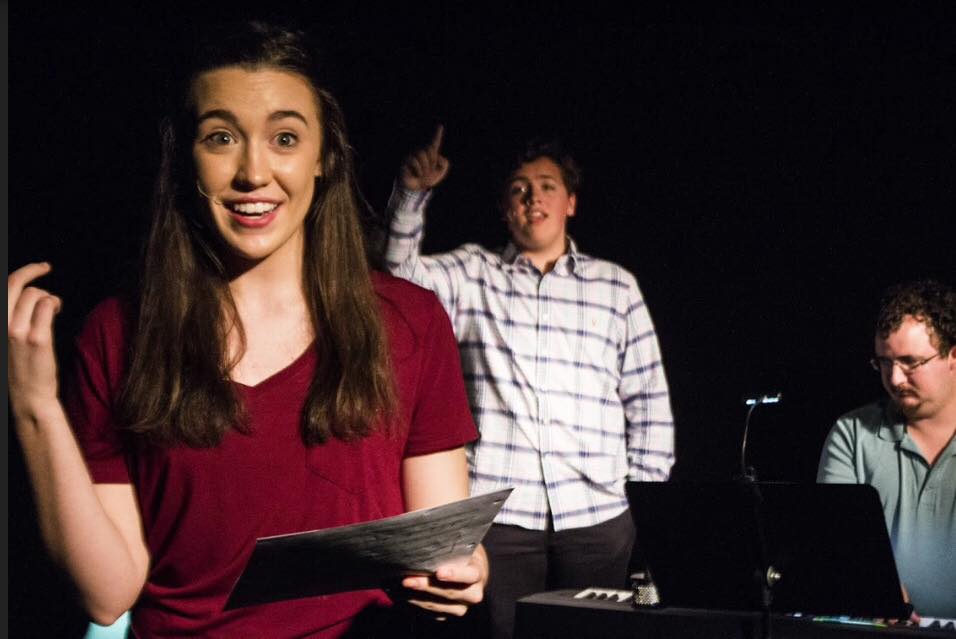Yesterday was the final day of the run of [Title of Show] at Iconotheatrix. It was a tremendous experience to be onstage with the very talented student cast.
I don’t really have a lot to say, because I would just end up repeating myself over and over and over, but honestly, this was the most fun I’ve had in quite awhile. For those who are unfamiliar, the pianist in [Title of Show] is an integral part of the cast. All of the characters are based on the creative team who developed the show, and the pianist is based on Larry Pressgrove, who helped as music director and orchestrator in the original productions of the show.
As a result, I not only played the piano, but interacted with the actors on several occasions, even delivering a few lines (which I haven’t done in years). I was in the full view of the audience, which meant that I had to be invested in the show the whole time.
But what that meant was that I got to watch this show every time. And this show was cast in a particularly interesting way. All but one role was double cast, but they didn’t alternate in a group. Instead, the collection of performers was slightly different in each performance. On top of it, the actors were encouraged to really interact in an organic way. They had to listen to each other, and really play together.
As a result, the show was significantly different at each performance. While this is not the ideal for every theatrical show, it is definitely unique. The audience genuinely enjoyed each performance, though sometimes it was because of the actors and other times it was the script. Regardless, it felt novel and exciting and a constant delight to be involved.
I want to thank the Iconotheatrix team for bringing me on board and the cast for welcoming me and for working so hard to pull of this rather challenging show.
The other fun thing about [Title of Show] is that it contains a really deep dive into musical theatre nerd territory. Given its meta-realism, there is a song about winning a Tony Award (that’s dismissed as obvious pandering), and the legendary Sutton Foster is name-checked.
But the song “Monkeys and Playbills” is literally constructed from a list of flop Broadway shows. I consider myself somewhat knowledgeable about shows. In fact, I have a list of somewhere upward of 800 titles that I’m trying to listen through. But nearly every title on mentioned was new to me.
The show is aware of its own rather nearsighted perspective on Broadway, but it’s built into the show. And it’s clear from the writing that it comes from a place of love. I was worried that my guests who were less theatre insiders would be turned off, but everyone I spoke to enjoyed the show. It definitely repays deeper study and rewatching.
The last thing I want to mention regarding this show is how close it hits home. As the director said to the cast before every performance: “This is our story.” Despite its specificity, it’s really the story of every artist trying to be original and stand out and make a living.
A musician friend of mine who came to see the show told me afterward that he felt incredibly inspired after seeing it. It makes you want to walk out and try your hand at something ambitious that might be a glorious failure.
Before I began playing this show, my favorite songs were “Die, Vampire, Die” which is about standing up for your creative voice, and “Nine People’s Favorite Thing” which is about finding your audience and letting them spread the word, rather than try for broad appeal.
But there are two other powerful songs that stand out to me now. The first is “Part of it All” which is the two main characters sharing their dreams of success. Everything from seeing the external signifiers of success (“a view of our billboard floating high above Times Square”) to the validation of others (“Part of a night to stare at your/super awesome Sardi’s caric’ture”).
When I dream of what a future as a successful artist, this song really hits home. Of course I want to be artistically validated, working on projects that interest me and fulfill me. But the external validation is great to imagine too. To be recognized on the street (unlikely for someone who wants to have his back to the audience) or be known by reputation—these are attractive dreams.
The other song that really hits home is “A Way Back to Then.” This song, sung as a kind of montage underscore by Heidi, is a lovely feature for solo voice. Of course, it’s told from the perspective of a young girl, but it is essentially about the joy of rediscovering your love for your work.
Sometimes, in the midst of a long day of rehearsals, or a slow week of teaching, it feels like I’m riding on sheer momentum. That I’m doing this work just because it’s what I do. But I genuinely love my jobs. I get excited by all kinds of things, especially seeing my students grow, and getting to explore new topics and tasks at the keyboard or with my students or casts. This song reminds me of how exciting it can be when the art takes over.
I think it’s because of these songs that I’m coming off of this show with a lot of artistic momentum. The next few weeks are very busy for me, but I’m excited for what’s coming.


